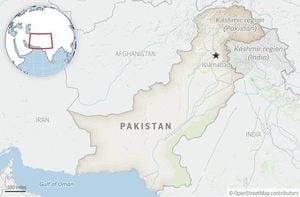When the dust settled on a balmy Buenos Aires evening, the world of football found itself at a crossroads of glory, heartbreak, and reflection. On September 5, 2025, two of Argentina’s most celebrated sons—Lionel Messi and Lautaro Martinez—etched their names into the headlines for reasons as contrasting as the emotions they stirred. From the euphoria of a hero’s likely farewell in his homeland to the lingering pain of a Champions League final humiliation, the stories of these stars, intertwined by national pride and personal struggle, have captivated fans far beyond South America.
Let’s start with the night’s brightest spotlight: Lionel Messi. The 38-year-old legend, now plying his trade with Inter Miami, delivered what is widely believed to be his final competitive appearance on Argentine soil in spectacular fashion. In front of a raucous crowd of 80,000 at Buenos Aires’ iconic stadium, Messi scored twice in Argentina’s 3-0 victory over Venezuela—a performance that was as much a parting gift as it was a personal celebration. Lautaro Martinez, his compatriot and friend, added a third in the 76th minute, sealing a dominant win for the reigning world champions.
Messi’s emotions were palpable from the moment he stepped onto the pitch, flanked by his three sons and serenaded by an adoring nation. The standing ovation he received before kickoff was a testament to his enduring impact on Argentine football. “There are so many emotions. I’ve experienced so many things on this field,” Messi said, his voice tinged with nostalgia and gratitude. “It’s always a joy to play in Argentina with our people. I’m very happy. Being able to finish in this way here is what I always dreamed of.”
For Messi, this farewell was about more than goals and glory. It was about closure—a chance to say goodbye to his countrymen in a way he never could with Barcelona, the club that shaped his legend but from which he departed abruptly in 2021. “For many years I have had the affection of Barcelona, and my dream was to have it here too, in my country with my people. For many years a lot of things were said but, well, I’ll stay with all the good,” he reflected. The numbers speak for themselves: 114 goals in 194 appearances for Argentina, a record that cements his place among the sport’s immortals. And while qualification for the 2026 World Cup had already been secured, the night was about Messi’s journey coming full circle—a celebration of a career that has inspired millions.
Yet, as Argentina celebrated, another story simmered beneath the surface—one of disappointment and introspection. Lautaro Martinez, Inter Milan’s captain and Messi’s teammate for the national team, recently opened up about the emotional toll of Inter’s crushing 5-0 defeat to Paris Saint-Germain in the Champions League final just months prior. The Nerazzurri’s path to the final had been nothing short of heroic, dispatching European giants Bayern Munich and Barcelona along the way. But the optimism that carried them to the brink of continental glory evaporated in the face of PSG’s relentless attack.
“I didn’t want to talk to anyone for five days,” Martinez confessed in an interview with France Football, as reported by FCInterNews. His words painted a picture of a leader brought low by the weight of expectation and the sting of failure. “I wanted to talk to my teammates, but nothing came out, I couldn’t say anything. I was stuck. I was distressed and sad.”
Inter’s defeat was as comprehensive as it was painful. PSG struck twice in the opening twenty minutes, shattering the Italian side’s composure and effectively deciding the contest before it had truly begun. By the final whistle, the scoreboard read 5-0—a result that Martinez described with a single, searing word: “impotence.” The Argentine striker lamented the team’s inability to translate their meticulous preparation onto the pitch. “Maybe the right word would be impotence, because we weren’t able to show what we’d worked on on the pitch. What we’d worked on in training, we couldn’t put into practice. More than anything, that was the thing that made us angriest.”
Martinez’s reflections cut deeper when placed in the context of Inter’s recent history. “In the last three years we’ve reached two Champions League finals. We had a great season, a great run. But we’ve always lacked something to achieve our main objective—the Champions League.” His candid admission of PSG’s superiority added a note of sportsmanship to the pain. “They deserved to win that final. Because they played a great match.”
But what of PSG’s own journey? The Parisian club’s pursuit of European supremacy has been a saga of high drama and even higher expectations, especially during the era of their celebrated attacking trio: Lionel Messi, Neymar, and Kylian Mbappe. Mauricio Pochettino, now leading the United States men’s national team, recently revisited his tumultuous tenure at PSG in a candid interview. The Argentine tactician described the period as both complicated and transformative, shaped by the immense pressure of managing three of the game’s most recognizable figures.
Pochettino’s assessment of the so-called “MSN” experiment was blunt. “What I learned at PSG was to understand what the obligations of players of that caliber are. For example, Mbappe is someone you have to put in the right position to hurt opponents. If you ask him to wear himself out defending or pressing, then you’re taking him away from what he does best—scoring goals,” he explained. Despite the star power, PSG failed to achieve their ultimate goal: Champions League glory. The project, Pochettino revealed, was undermined by a “hostile environment”—a phrase he used to encapsulate the tension and criticism that dogged Messi and Neymar, especially as fans turned against them towards the end of their stints in Paris.
“In Leo’s case, it was a very hostile environment in France. He arrived without a preseason, after a big emotional blow, and it wasn’t easy. At least for me, it was painful to see, because the atmosphere wasn’t favorable to him—it was very aggressive. But I did enjoy having him,” Pochettino admitted. Even so, he expressed no regrets and said he would welcome the chance to manage such superstars again, now armed with the lessons learned from that turbulent chapter.
As the football world looks ahead, the stories of Messi, Martinez, and Pochettino serve as reminders that triumph and adversity are often two sides of the same coin. Messi’s emotional farewell in Buenos Aires showcased the joy of a dream fulfilled, while Martinez’s somber recollections and Pochettino’s hard-won wisdom highlighted the resilience required to navigate the game’s harshest moments. For fans, these narratives offer both celebration and contemplation—a fitting tribute to the beautiful game’s enduring drama.
With Messi’s international swan song drawing near and Inter Milan, PSG, and their stars all facing new chapters, one thing is certain: football’s greatest stories are never truly finished. They simply await the next whistle, the next goal, and the next unforgettable night under the lights.





